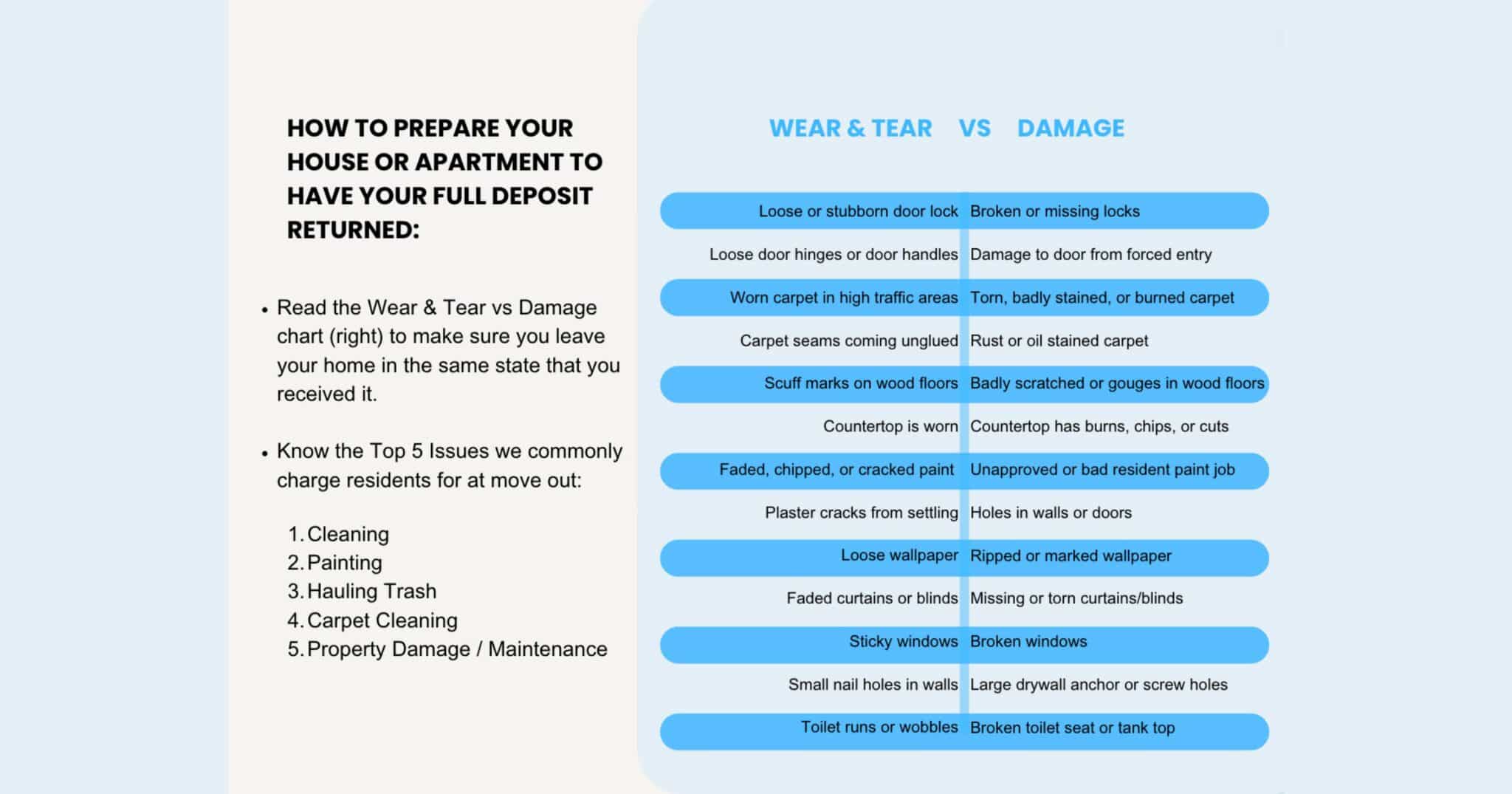Property owners and managers intend and hope to deliver a full security deposit refund for all tenants—a full refund means the property is in good condition with no damage to repair. However, security deposit reductions are necessary to support the cost of maintenance and repairs.
As a professional property manager, here is my advice on how to get a full security deposit refund at the end of your tenancy.
What is a Security Deposit?
A security deposit is a refundable fee collected at the beginning of a lease. The amount of a Florida security deposit varies depending on the property owner’s preferences but is typically the amount of 1-1.5x the monthly rent.
A security deposit is collected as a fee to ensure the upkeep of the property and the lease agreement throughout the rental term. If the property is left the way it was upon the lease start date, undamaged and clean, the security deposit can be fully refunded to the tenant. The security deposit can be refunded partially or not at all if there is damage to the property or if it is left in an unclean condition. In Florida, a full refund of the security deposit must be returned to the tenant within 15 days of the move-out date.
Read Your Lease Agreement
Many people do not read their lease agreement in its entirety, and some can be lengthy and tedious. However, those committed to receiving their full security deposit should be familiar with its contents. The lease agreement will outline the terms and conditions of security deposit refunds, including what the landlord deems damage vs. normal wear and tear.
Knowing the rules and regulations regarding what constitutes a security deposit deduction will help you get your full security deposit refund.
Complete a Thorough Move-in Inspection
Make sure to inspect your property thoroughly upon the start of your lease. Doing so helps avoid getting charged for pre-existing damage that is not your fault. Although it may feel tedious, it is essential to document any damage, even if it is just a scratch on the wall. Submit notes and picture evidence to your resident portal or property manager within 24 hours of moving into your property.

At the end of your lease, your property manager will inspect the property, comparing its current condition to its previous condition. If there are any differences, new damage, or existing damage that was not documented, you may be charged for it.
Adhere to the Lease Agreement
Once settled into the rental property, you must adhere to the lease agreement and restrictions on altering the unit. Decorating your new home can be fun and exciting. However, this is where a lot of security deposit deductions come from. Painting without permission, leaving holes or ripped paint on the walls, and excessive dirt and filth are common causes of security deposit deductions.
Some lease agreements are hyper-specific about decoration requirements, while others are more vague. Some lease agreements specify the materials that must be used to hang wall decor, the process for getting approval to paint, and how to fix any damage. Following the specifics of the lease agreement is absolutely necessary if you want to receive your full security deposit refund.
According to your lease agreement, some charges may include:
- Cleaning charges
- Carpet cleaning charges
- Trash out / hauling charges
- Light bulb replacement charges
- Lawn / Landscaping charges
- Painting charges
- Wall repair charges
- General repair and maintenance charges
- Filter charges
Fees may include:
- Move-in / move-out inspection fees
- Security deposit disposition processing fees
- Administrative processing fees
- Rent-ready maintenance coordination fees
Although this is not comprehensive, the above list includes common causes of security deposit charges. Please refer to your lease agreement for complete details.
Wear and Tear Vs. Damage
Tenants are generally not held responsible for normal wear and tear. Wear and tear refers to aspects of the apartment that become worn down with normal use and everyday living. Wear and tear differs significantly from damage caused by tenants. It’s important to know what constitutes normal wear and tear and what constitutes damage.

Some examples of wear and tear are:
- Loose or stubborn door lock
- Loose door hinges or door handles
- Worn carpet in high traffic areas
- Carpet seams coming unglued
- Scuff marks on wood floors
- Countertop is worn
- Faded, chipped, or cracked paint
- Plaster cracks from settling
- Loose wallpaper
- Faded curtains or blinds
- Sticky windows
- Small nail holes in walls
- Toilet runs or wobbles
Some examples of damage are:
- Broken or missing locks
- Damage to door from forced entry
- Torn, badly stained, or burned carpet
- Rust or oil-stained carpet
- Badly scratched or gouges in wood floors
- Countertop has burns, chips, or cuts
- Unapproved or bad resident paint job
- Holes in walls or doors
- Ripped or marked wallpaper
- Missing or torn curtains or blinds
- Broken windows
- Large drywall anchor or screw holes
- Broken toilet seat or tank top
Depending on the severity of the situation, damage caused by the tenant will result in a reduction of security deposit or no refund.
Deep Clean the Property
Cleaning your rental property is essential in the move-out process to ensure the return of your security deposit. Many tenants believe deep cleaning their rental property upon move-out is unimportant. However, it is one of the most common causes of security deposit charges.
Many property management companies require tenants to hire a professional cleaning service and provide proof of receipt. Whether or not a professional cleaning service is needed will be outlined in the lease agreement. However, I highly recommend doing so either way.
Leaving your property in condition to receive your full security deposit includes:
- Cleaning all carpets / mopping all floors
- Bathrooms: clean and unclog toilets, sinks, shower, floors, mirrors
- Kitchen: empty and clean refrigerator, clean all appliances, counters, cupboards, mop floors
- Bedroom and living rooms: remove all furniture and decor
Follow Move-out Procedures
Specific move-out procedures vary depending on the lease and property manager. Your property manager will communicate and outline the end-of-lease protocol and what to do on move-out day. Following move-out procedures such as moving out on time, returning keys, and providing your forwarding address will contribute to the refund of your security deposit.
Security Deposit Refund Advice From a Property Manager
As a professional property manager, I know the ins and outs of security deposit refunds and what constitutes a security deposit charge. Security deposit refunds are strict, and this fee ensures that the property owner can cover potential damage expenses to keep their property in top condition.
Tenants may be upset if they do not receive the full security deposit refund; however, there is always a reason for it. At The Listing Real Estate Management, we thoroughly inspect each property upon move-out to evaluate its condition in comparison to the move-in inspection. Any damage or uncleanliness is recorded and documented for evaluation. The security deposit will not be refunded in full if there is damage, uncleanliness, missing keys, or lease violations.
As the lease agreement outlines the terms and conditions of security deposit charges and refunds, I advise reading and adhering to the lease agreement. Everything you need to know about getting your security deposit fully refunded will be included in your lease; if not, communicate with your property manager, and they will be happy to provide clarification. While moving out and completing your move-out checklist, ensure all aspects of the apartment are up to the standard of when you moved in. If you are eligible, your property manager will refund the security deposit within 15 days of moving out. Always check your lease agreement and consult your property manager with any questions!
Copyright © 2017-2024, The Listing Real Estate Management. All Rights Reserved.






